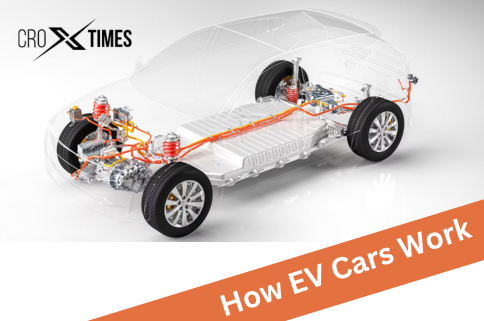Unlike gas-powered vehicles, EVs do not require internal combustion engines to operate, there is an electric motor and rechargeable battery pack, and EVs move along our roadways without burning gasoline or producing harmful emissions, while generating less noise pollution.
If you are someone who is willing to how EV cars work then this post from the experts at crox times is prepared just for you. Read this till the end.
How EV Cars Work in India
Electric vehicles (EVs) are becoming increasingly popular, with more and more people switching to them as their primary mode of transportation. Unlike traditional gasoline-powered vehicles, EVs rely on electricity to power their motors. Let’s take a look at its overall working.
- The Battery- The most important component of an electric vehicle is the battery. EVs use rechargeable lithium-ion batteries to store energy. These batteries are similar to the ones used in laptops and cell phones but much larger and more powerful. They can store enough energy to power the vehicle for many miles.
- The Electric Motor- Electric vehicles leverage the power of electric motors instead of combustion engines. The motor converts electrical energy from the battery into mechanical energy to power the wheels of the car. Unlike gasoline engines, electric motors have fewer moving parts, making them more efficient and reliable.
Read- 7 Best Mileage EV Car in India
- Regenerative Braking- When an electric vehicle is in motion, it generates kinetic energy. Regenerative braking is a feature that allows the vehicle to capture some of that energy and convert it back into electricity to recharge the battery. This feature helps extend the driving range of the vehicle.
- Charger- EVs need to be charged in order to work efficiently. Chargers are used to convert the alternating current (AC) from the power grid into direct current (DC) that can be stored in the battery. There are three main types of chargers: Level 1, Level 2, and Level 3. Level 1 chargers can be plugged into a standard 120-volt household outlet and take a long time to charge. Level 2 chargers require a 240-volt outlet and can charge an EV in a few hours. Level 3 chargers are the fastest and can charge an EV in as little as 30 minutes.
- Energy Management System- Electric vehicles have an energy management system that controls the flow of energy between the battery, electric motor, and other components of the vehicle. This system optimizes the use of energy to improve the driving range and efficiency of the vehicle.
- Range- The range of an EV refers to the distance it can travel on a single charge. The range of an EV depends on several factors, including the size of the battery pack, the weight of the vehicle, and the driving conditions. Some EVs have a range of over 300 miles on a single charge, while others have a range of fewer than 100 miles.
- Charging Infrastructure- One of the challenges of owning an EV is access to charging infrastructure. While EV charging stations are becoming more common, they are still not as widely available as gasoline stations. However, the situation is improving, with more charging stations being installed every day. Additionally, many EV owners choose to install a Level 2 charger at home, which allows them to charge their vehicle overnight.
These are factors that answers the question “how EV cars works”. It’s never too late for switching towards electric vehicles as it not helps in sustainable development but it also keeps you and your loved ones healthy.
Check Now-
- 6 Best Off Road Electric Car Vehicles SUV
- Best Affordable Electric SUV Cars in India
- Best EV Cars Under 10 Lakhs
Conclusion
Electric vehicles are an exciting technology that is rapidly changing the transportation industry. By understanding how electric vehicles work, you can make an informed decision about whether they are right for you. With advancements in technology, electric vehicles are becoming more affordable, more efficient, and more widely available. In the future, we may see even more innovation in the electric vehicle market, making it an even more compelling choice for drivers. And we really hope you got the answer to your question “how EV Cars Works”
FAQ Related to How EV Cars Work
How is EV better than petrol?
Well, electric vehicles use electricity to charge their batteries instead of using fossil fuels like petrol or diesel. Electric vehicles are more efficient as they cost of charging than petrol or diesel.
How long do electric car batteries last?
The average life expectancy of electric car batteries is somewhere between 15 to 20 years.
What is the price of EV car batteries in India?
The cost of EV car batteries in India goes between 15,000 and 20,000.
What is the average mileage for EV cars?
The average Mileage for EV cars is somewhere between 250km to 300km on a single charge.
Can we charge an electric car at home?
Most owners rely on electric car charging at home. The car gets charged overnight and it is the cheapest mode of charging.


